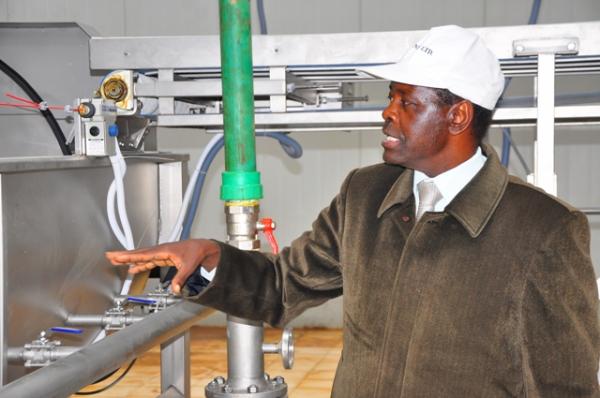The potato is the second most important food crop after maize but its potential remains unexploited. The crop employs more than 2.5 million people and has a higher yield per square metre and three harvesting seasons a year than maize.
However, the crop’s dwindling returns coupled with erratic prices have seen farmers shift to more lucrative crops. And while potato processing is big business in Europe, the United States and South Africa, Kenya is yet to tap into this lucrative business. But this dream will soon become a reality if a potato processing factory in Nyandarua whose cold storage is the first of its kind in the East African region assumes a complete commercial status.
The facility set for completion eight years after the foundation stone was laid is expected to earn farmers Sh200 million per season. The facility with a modern cooler and which sits on Sh700 million assets, is the brain child of chairman of Midlands Limited Junghae Wainaina and becomes operational in two months time.
The cooling facility – which can keep potatoes fresh for up to three years – and a processing factory will enable farmers to collect and store their produce and then release it as per market demand all yearround. This is unlike the current state where a glut results in low market prices and unnecessary wastage. IAs it gets ready to venture into commercial business, Midlands Ltd share value has reportedly grown three fold and the management is mulling plans to go public before 2017 besides introducing an exporting line.
“There is a high demand for processed chips on the international market and we are planning to get into this business,” Wainaina told The People. Value addition is the cornerstone of the facility which specialises in collection, grading and storage of potatoes, making ready-to-cook potato chips or fries that have found a ready market in selected supermarkets and fast food outlets.
“The demand for our chips is so high we can hardly meet it,” said Wainaina pointing out that ready-to-cook chips saves users the trouble of peeling, cleaning, chipping and waste disposal. Once operational, the facility’s initial products will comprise mukimo, processed vegetables, animal feed and vegetable juices.
About 1,000 farmers have been contracted and are being supported with seed, agronomy and delivery of produce to the factory, benefiting 300 households and an estimated 250,000 people are now enjoying incomes and improved lifestyles due to a ready market for their farm produce. “The social impact of Midlands is what Vision 2030 seeks to achieve since it embraces the entire agriculture production value chain – farming, marketing, and processing in the rural areas,” Wainaina said.
The company at present collects potatoes for grading, storing and selling the crops through established networks like supermarkets and hotels. Farm gate prices initially stood at Sh3 per kilo but farmers now are paid Sh20. Recently, potato farmers in Kinangop pleaded with the government to intervene and control the farm gate prices of potatoes to protect them from brokers.
Other long-term plans include drying vegetables which go to waste during the glut and processing of long-life fries, crisps, pringles and potato flour. “We must begin by adding value to farm produce at the villages,” Wainaina said adding that there is a big market for food, locally and outside. Wainaina stresses the need for concerted efforts from the government and private sector to set up agro-industries if Kenya is to attain the Vision 2030 status.
He urged policy makers to support the crop by subsidising seeds and fertilisers, as well as availing cheaper credit to marketing organisations to create a value chain that would ensure maximisation of production. “All important crops in the country have a government support mechanism and the same should apply to promotion of potatoes,” he said.
At the same time, the government is formulating a policy to position the potato as a strategic crop, to boost food security and job creation. The government recently formed the National Potato Council of Kenya (NPCK) and has mandated it to formulate a new policy to guide the growth of the industry.
At the same time, the International Potato Centre, CIP, an international research institution headquartered in Nairobi is designing a potato seed master plan, which the government has promised to adopt. A senior official at Kenya Agricultural Institute (Kari), Nduire Waiganjo says the crop has been neglected in the past despite its potential to boost famers’ incomes and generate employment as brokers reign.
Midlands Ltd hopes to offer farmers better incomes and create employment through agro-processing of local produce and waste management. The main focus products include pyrethrum, potatoes, peas, carrots, cabbages
and herbs.
By WAHINYA HENRY
Monday, 11 February, 2013

